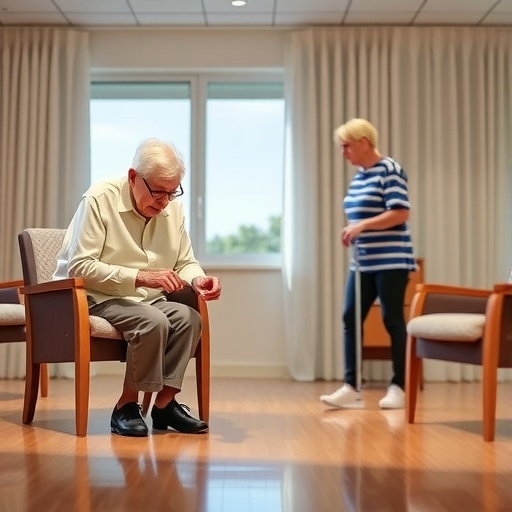
A groundbreaking international study led by researchers at Flinders University has unveiled vital strategies to reduce the incidence of falls among elderly residents in care facilities. This comprehensive meta-analysis synthesizes data from more than 104 clinical trials, involving nearly 69,000 older adults across 25 countries, making it the largest and most detailed investigation to date on fall prevention in aged care environments. The study’s findings emphasize the importance of individualized interventions, highlighting tailored exercise programs, vitamin D supplementation, and optimized nutrition as key components in mitigating fall risks.
Falls among elderly populations represent one of the gravest health challenges faced by aged care services worldwide. Not only do falls frequently cause fractures and serious injuries, but they also precipitate prolonged hospitalizations and contribute to a decline in autonomy and quality of life. In response, the research team, spearheaded by Dr. Suzanne Dyer from the College of Medicine and Public Health and the Flinders Health and Medical Research Institute, sought to identify replicable and evidence-based methods to curtail falls within institutional settings. Their meticulous meta-analysis consolidates global research to inform best practices in aged care facilities.
A central revelation of the study is the potency of exercise regimens customized to the specific physical and cognitive abilities of each resident. Regular, supervised physical activity—particularly when conducted consistently in group settings or involving at least one hour per week—demonstrated a marked reduction in fall frequency. Notably, these benefits extended even to those residents experiencing cognitive impairments, such as dementia, thereby underscoring the universal applicability of exercise interventions tailored to individual needs.
Vitamin D supplementation emerged as another critical intervention to improve musculoskeletal health in elderly residents. Deficiencies in vitamin D are prevalent in aged care populations due to limited sun exposure and dietary intake, factors that compromise muscle strength and balance. By correcting these deficiencies, vitamin D supplementation significantly decreased the overall number of falls, suggesting that targeted nutritional supplementation should be a standard component of fall prevention strategies.
Nutritional enhancement also played a decisive role in fall risk reduction. The study evidenced that increasing consumption of calcium-rich dairy products, such as milk, cheese, and yogurt, materially improved bone density and musculoskeletal stability, thereby reducing the likelihood of fractures when falls occurred. Dr. Dyer emphasizes that integrating these calcium and protein-rich foods into daily diets can fortify bone health and contribute to sustained independence among aged care residents.
The research further illustrates the efficacy of multifaceted approaches involving environmental assessments, medication reviews, and personalized exercise plans. Tailoring each intervention to individual resident profiles, reinforced by committed support and engagement from aged care staff, created synergistic benefits surpassing those achieved through any single strategy. This person-centered model represents a significant leap forward in practical fall prevention methodologies.
Importantly, the meta-analysis also scrutinized interventions with limited effectiveness when applied in isolation. Techniques such as medication deprescribing, routine staff training, or wholesale changes to care models without concurrent individualized components did not consistently result in fall reduction. This finding challenges traditional paradigms and urges a reevaluation of existing fall prevention policies to prioritize evidence-based, customized interventions.
The implications of this research are profound for policymakers, healthcare providers, and families of elderly care recipients. The holistic, tailored approach offers a pathway to dramatically enhance resident safety and reduce healthcare burdens arising from fall-related injuries. By reframing fall prevention within an individualized and multidisciplinary framework, aged care facilities can foster greater autonomy, improved health outcomes, and enhanced quality of life for their residents.
Dr. Jenni Suen, co-author of the study, articulates the significance of a nuanced, adaptable approach. Rather than relying on uniform solutions, the study advocates for deploying combinations of effective interventions that cater specifically to resident capabilities and needs. This dynamic strategy ensures that preventative care is both flexible and effective across diverse aged care populations.
Beyond clinical settings, this research accentuates the importance of integrating scientific insights into everyday aged care practices. Effective implementation depends not only on the evidence but on systematic staff training and organizational commitment to maintain tailored regimens. The high level of staff engagement reported in successful interventions points to the necessity of fostering a culture of proactive, resident-focused care in aged care homes worldwide.
Funded in part by the Australian National Health and Medical Research Council and supported by international collaborators, the study represents a triumphant example of global scientific cooperation in addressing a pressing public health concern. Its comprehensive scope and rigorous analysis provide a robust foundation for international guidelines and standards in fall prevention for older adults in residential care environments.
In conclusion, this landmark meta-analysis demystifies the complex challenge of preventing falls among elderly care residents by unveiling targeted, evidence-based interventions that are both practical and scalable. Tailored exercise programs, vitamin D supplementation, and improved nutrition, combined with personalized assessment and staff engagement, form the cornerstone of effective fall prevention. As the aged care sector grapples with an aging global population, these insights offer hope for safer, healthier, and more independent lives for millions of older adults.
Subject of Research: People
Article Title: Interventions for preventing falls in older people in care facilities
News Publication Date: 20-Aug-2025
Web References:
Cochrane Review Interventions for preventing falls
DOI Link
References:
Dyer SM, Kwok WS, Suen J, et al. Interventions for preventing falls in older people in care facilities. Cochrane Database of Systematic Reviews. 2025; CD016064.
Image Credits: Flinders University
Keywords: fall prevention, aged care, elderly, vitamin D, exercise programs, nutrition, meta-analysis, individualized care, dementia, musculoskeletal health
Tags: clinical trials on fall preventioncomprehensive meta-analysis of fall preventionelderly fall risk managementevidence-based practices in aged carefall prevention strategies in aged carehealth challenges in elderly populationsimproving quality of life for seniorsindividualized interventions for fall preventioninternational research on elderly fallsnutrition optimization in aged caretailored exercise programs for seniorsvitamin D supplementation for older adults




